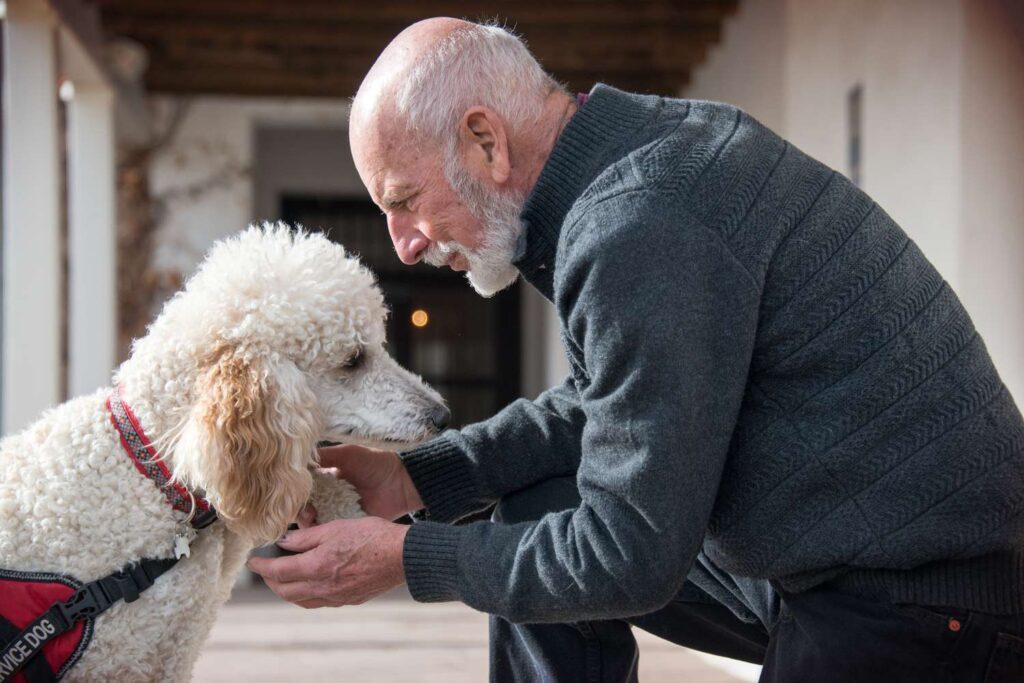
The bond between humans and dogs is undeniably special, transcending mere companionship to encompass profound emotional support and understanding. For individuals struggling with depression and anxiety disorders, the presence of a canine companion can offer a lifeline of comfort, companionship, and healing. In this article, we’ll explore the psychological benefits of interacting with dogs for individuals with depression and anxiety disorders, shedding light on the transformative power of the human-canine bond.
1. Emotional Support
Dogs have an innate ability to sense and respond to human emotions, offering unconditional love and support during times of distress. For individuals with depression and anxiety disorders, the presence of a dog can provide a sense of comfort, security, and companionship that is unmatched by any other form of therapy or treatment. Simply petting, cuddling, or interacting with a dog can help reduce feelings of loneliness, sadness, and anxiety, providing a much-needed emotional boost.
2. Stress Reduction

Interacting with dogs has been shown to reduce levels of stress hormones such as cortisol and increase the production of feel-good neurotransmitters like serotonin and dopamine. Spending time with a dog can promote relaxation, lower blood pressure, and alleviate symptoms of anxiety and tension. Even just a few minutes of playtime or a leisurely walk with a canine companion can have profound effects on mood and well-being, helping individuals with depression and anxiety disorders manage their symptoms more effectively.
3. Social Connection
Dogs are natural social facilitators, helping individuals with depression and anxiety disorders connect with others and overcome feelings of isolation and withdrawal. Walking a dog in the neighborhood or visiting a dog park provides opportunities for social interaction and engagement with fellow dog owners, fostering a sense of community and belonging. Dogs serve as icebreakers and conversation starters, helping individuals with depression and anxiety disorders overcome social barriers and build meaningful connections with others.
4. Routine and Structure
Dogs thrive on routine and consistency, providing individuals with depression and anxiety disorders with a sense of purpose and structure in their daily lives. Caring for a dog requires regular feeding, grooming, exercise, and companionship, which can help establish a sense of routine and responsibility. Having a furry friend to care for can motivate individuals to get out of bed, stay active, and maintain healthy habits even on difficult days, providing a sense of purpose and fulfillment.
5. Mindfulness and Presence
Interacting with dogs encourages mindfulness and present-moment awareness, helping individuals with depression and anxiety disorders focus on the here and now rather than dwelling on past regrets or future worries. Dogs live in the moment, fully immersed in their sensory experiences and attuned to the present environment. Spending time with a dog encourages individuals to slow down, savor simple pleasures, and appreciate the beauty of the present moment, fostering a sense of calm and contentment.
6. Distraction and Enjoyment

Dogs have a unique ability to distract individuals from negative thoughts and emotions, providing moments of joy, laughter, and playfulness even in the midst of despair. Engaging in activities such as playing fetch, going for a hike, or teaching new tricks can provide a welcome respite from the challenges of depression and anxiety disorders, offering moments of pure enjoyment and connection with a beloved pet.
7. Unconditional Love
Perhaps the greatest gift that dogs offer individuals with depression and anxiety disorders is the gift of unconditional love and acceptance. Dogs love their human companions unconditionally, without judgment or expectation, offering a source of comfort and reassurance in times of need. The unwavering loyalty and devotion of a canine companion can help individuals with depression and anxiety disorders feel valued, accepted, and worthy of love, promoting a sense of self-esteem and belonging.
The psychological benefits of interacting with dogs for individuals with depression and anxiety disorders are profound and multifaceted, encompassing emotional support, stress reduction, social connection, routine and structure, mindfulness, distraction, enjoyment, and unconditional love. The human-canine bond offers a powerful source of healing and resilience, providing individuals with a furry friend to lean on during life’s darkest moments. By recognizing and harnessing the therapeutic potential of the human-canine bond, we can help improve the lives of individuals struggling with depression and anxiety disorders and promote overall well-being and happiness for both humans and dogs alike.

